Relevant Overviews
- Content Strategy
- Online Strategy
- Online Community Management
- Social Media Strategy
- Content Creation & Marketing
- Digital Transformation
- Innovation Strategy
- Surveillance Capitalism, Social media and Polarisation (Overview)
- Communications Tactics
- Psychology
- Productivity
- Social Web
- Media
- Politics
- Communications Strategy
- Science&Technology
- Business
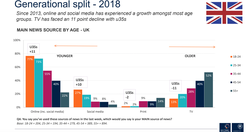
echo chambers and filter bubbles are slightly different... echo chambers could be a result of filtering or ... other processes, but filter bubbles have to be the result of algorithmic filtering...people main source of news roughly equal ... online and television... TV is more likely... people over 45. People under 45 are more likely to get their n…

report reviews and summarises the recent available literature connecting polarisation and the news media...key findings...: little evidence that increased exposure to news featuring like-minded or opposing views leads to the widespread polarisation of attitudes... some studies found both can strengthen attitudes of minority who already hold stron…

Technology has altered the foundations of news and media, and as trust in media continues to decline, artificial intelligence, machine learning, and algorithms have come to play a critical role not only as threats to the integrity and quality of media, but also as a source of potential solutions. The core threats to information quality associated …

“We wanted democracy... but got mobocracy.”... Bots generated one out of every five political messages posted on Twitter in America’s presidential campaign last year... “we need to reform our attention economy.”... groups which had mostly been excluded from the mainstream media... developed the dark arts they would use to further their agendas..…
small experiments aimed at customizing that story selection to the individual reader, based on a variety of signals... where readers are located... the last time a reader visits the site. If,... publishes a particularly enterprising story on a Monday, but a reader doesn’t visit ... after that story has left the homepage ... personalize the user’s…
In the realm of knowledge, monopoly and conformism are inseparable perils. The danger is that these firms will inadvertently use their dominance to squash diversity of opinion and taste. Concentration is followed by homogenization... news media ... have rushed to produce articles that will flourish on those platforms... a duplication of the news…
our analysis shows that social media use is clearly associated with incidental exposure to additional sources of news ... with more politically diverse news diets... The algorithms, of course, continually change... More sources does not necessarily mean more diverse... the majority in most countries and in most groups do not use sources from a…

In the United States... the chances that two people visiting the same news site have different political views is about 45 percent... the internet is far closer to perfect desegregation than perfect segregation... you are more likely to come across someone with opposing views online than you are offline... a surprising amount of the information …

uses machine learning to give readers a stream of 25 stories they might be interested in based on their preferences, but 'always including an element of surprise'... personalisation will be based on the meaning of an article... users' existing history that shows roughly what type of stories they are interested in

AllSides.com offers the news you’d expect on any US politics site, except that its lead stories include a choice of articles: one from the left, centre and right... to push the comfortably certain in new directions... When you click on one story you’re offered a range of alternatives... a patented ‘crowd-driven’ political bias rating. Visitors ..…

We know little about the amount of fake news an average citizen consumes, or how it fits into their overall news diet... What we found calls into question the severity of the fake news crisis.... We gathered data for both the real and fake news sites from comScore... First, the fake news audience is tiny compared to the real news audience–about 1…

Where things get interesting is to consider the deep cognitive mechanisms that shape the emergence of truth networks where a coherent shared set of understandings, assumptions, and beliefs are in play.

Fake news has been around as long as real news... Social media has certainly transformed how fake news circulates, speeding up its circulation and extending its reach and impact... a much more important problem ... is the continuing delegitimization of real news by American conservatives... This is not “fake news.” It is a blatantly ideolog…

A work in progress from an upcoming eponymous post. Another experiment with the enewsletter format: some initial thoughts on this seemingly intractable problem, with some of the source materials I’m studying.
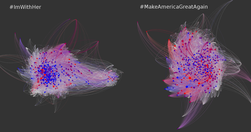
my research team’s analysis of data from Columbia University’s Emergent rumor tracker suggests that this misinformation is just as likely to go viral as reliable information... limiting news fakers’ ability to sell ads... a step in the right direction. But it will not curb abuses driven by political motives... Using BotOrNot, our colleagues found…

Perfectly open communities always go sour. You need filters. Every functional community has them. And that’s where machine learning comes in... If you can detect trolls, you can protect the people they’re trolling by muting or putting a warning over the trolls’ posts... Twitter... already have a way of screening out porn. Why don’t they do the sam…

a lot of people don’t know fake news when they see it, sensationalized reports are more likely to go viral on social media than sane ones, and distrust of traditional (and genuinely more reliable) media sources is rising. Professor Nicole A. Cooke ... focusing on human information behavior, information literacy, and diversity in librarianship.... …

As Facebook attempted to capture the fast-moving energy of the news cycle from Twitter... it built a petri dish for confirmation bias... Here’s how... ‘Share’ Button ... encouraging people to share quickly and without much thought... “original sharing,” where people post their own photos, text updates... was declining..., content from celebritie…

“So all the fact-checking of Trump’s lies, all the investigative journalism about his failures, even the tapes — none of it meant anything.” In short, what happened to news ...? determining what counts as journalism and who counts as a journalist is a perpetual struggle ... No single trend explains the dissolution of news... What we ended up with…
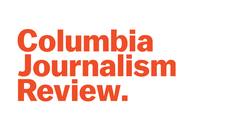
with newsrooms reeling... a weakening of the stable platforms threatens to cause general informational impoverishment, a degradation of the entire information ecosystem. Adding to the worry, people today are exposed to news ... through a single platform—mainly social networks, which tend toward a clustering of like-minded individuals. Together,…

This year's report reveals new insights about digital news consumption based on a YouGov survey of over 50,000 online news consumers in 26 countries including the US and UK.The report suggests that publishers across the world are facing unprecedented levels of disruption to business models and formats from a combination of the rise of social platf…
Ironically, with the widening of (national) news choices that the Internet has spawned, we’re depending on fewer pipelines of news. It’s a narrowing of the filter funnel...t as troubling as the filter bubbles that used to occupy our concerns, but likely more potent. As those pipelines narrow, necessarily, the decision on what is news, and what is …
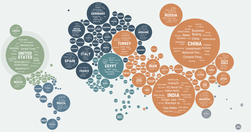
Search engines, social media and news aggregators are great at surfacing information close to our interests, but they are limited by the set of topics and people we choose to follow. Even if we read multiple news sources every day, what we discover is defined by the languages we are able to read, and the topics that our sources decide to cover. Ul…

... manually curate 10 stories from other publishers, which will run as a daily edition. Three different articles, often with opposing viewpoints, will run on each story, representing the left, neutral and right-wing political perspectives on the same story... For example, in Wednesday’s edition, it ran a Guardian story entitled “Terrorism publ…
"Skeptics are howling that this is a Faustian bargain—that the media are mortgaging their long-term futures for short-term gain... Facebook has presented the news media with a collective-action problem. News sites aren’t blind.... if they could all get together and decide, as a group, what to do about Facebook, no doubt they’d think long and hard…

"The problem is that Facebook controls what you see and when. If it becomes the primary way to consume news and watch videos, what happens when a news story is controversial about the company itself? Or isn’t within its content guidelines (like pornography)? You’ll be receiving a filtered version of the internet that’s controlled by one company."

"The New York Times is preparing to plant a taproot right inside the highly walled garden that is Facebook." - Memo To Publishers: Watch Where You Put That Taproot… — Medium

Seems Zuck's taken Filter Bubble criticisms to heart, combining human & machine curation (now where have I heard that before?) to create what Techcrunch calls “content serendipity” (wish I'd coined that one): "Each Section combines stories chosen by Facebook’s human editors and surfaced by the Paper algorithm [from] a publication, blogger, publi…
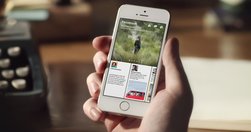
"You also can't add any site you want, as with a traditional RSS reader. Instead, Facebook has hired a team of content curators to pick stories for you in one of a dozen or so categories ranging from basic news to cute animals." - With Paper, Facebook just blew its own iPhone app out of the water | The Verge
"Scholars have worried that proliferation of personalization technologies will degrade public opinion by isolating people from challenging perspectives... study examines personalized news recommender system designs using a communication mediation model.... Results indicate increased selective exposure when using personalized news systems... portal…
Relevant Overviews
- Content Strategy
- Online Strategy
- Online Community Management
- Social Media Strategy
- Content Creation & Marketing
- Digital Transformation
- Innovation Strategy
- Surveillance Capitalism, Social media and Polarisation (Overview)
- Communications Tactics
- Psychology
- Productivity
- Social Web
- Media
- Politics
- Communications Strategy
- Science&Technology
- Business